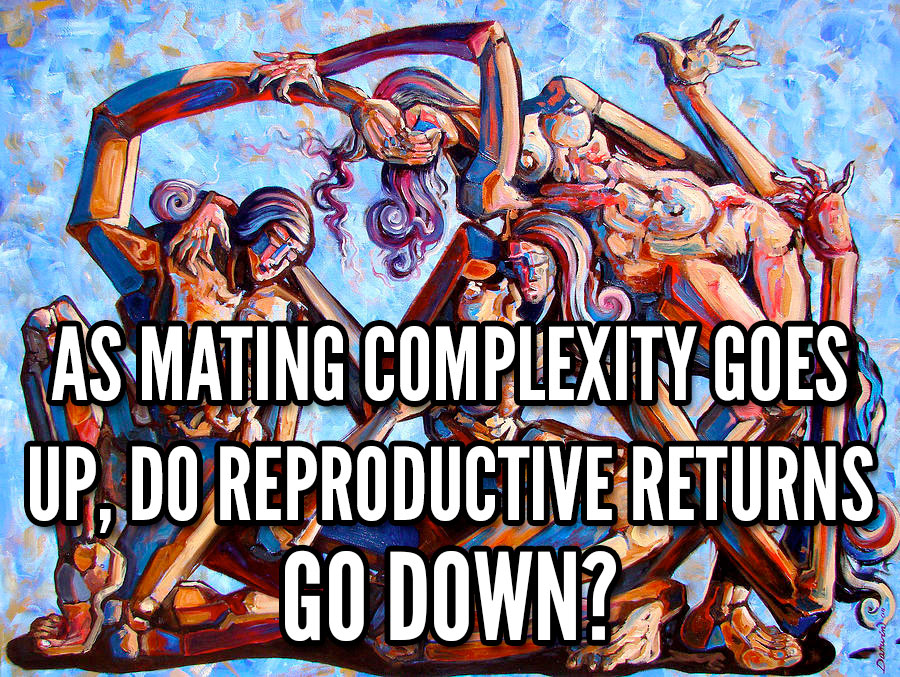
Mating gets more complex as our societies become more complex. But as complexity rises, does the law of diminishing (reproductive) returns set in? (image source: Darwin Leo)
Bit of an abstract/sociological article here.
A little more academic than usual, too.
If you'd prefer tactics on dealing with an increasingly complex mating market, see my Game Imbalance Theory series. Otherwise, if you're down for a little academic sociology, let's proceed...
I'm reading through John Tainter's brilliant The Collapse of Complex Societies. Tainter's premise is civilization (or society, as he prefers to call it) is a problem-solving entity. As a society encounters new problems (like a food shortage or a militaristic neighbor) it adds new layers to itself, to address the problem (more intensive farming, or the training of a better military). These new layers make the society more complex.
As the society becomes more complex (to deal with more problems), it requires more resources. For a while it gets these through conquest or opening up new resource channels. Later it must get them by raising taxes on the population and by controlling more and more of its populace's lives. The further along this process it goes, the greater the demands on the society's support population become, and the smaller the returns on its increasing complexity get. It must demand more and more, to support greater and greater complexity, for less and less return.
As I've read Tainter, it's gotten me thinking about romantic relationships. There are some fascinating trends in dating, mating, and reproduction... trends like:
-
People in cities have lower birth rates than people in the countryside
-
People in cities marry later than people in the countryside (and marry less overall)
-
Teenagers in cities have 63% fewer pregnancies than teenagers in the countryside
-
Birth rates overall are falling across industrialized regions (U.S.; China; E.U.; Japan)
Anecdotally, the Battle of the Sexes seems to have reached fevered pitch, with many jilted women asking "where all the good men have gone" and many jilted men complaining they didn't go anywhere but were overlooked while these women were too busy "riding the cock carousel" (and now no longer want these "post-wall" women). This is something it's harder to quantify, but I've gone through a fair few newspaper advice columns from the 1880s through the 1950s and don't recall coming across anything close to this level of back-and-forthing between the sexes.
Divorce rates have skyrocketed, even as the availability of sex partners seemingly has too (I can't find much data on historical lifetime sex partners, unfortunately, but I find it hard to believe the average number of lifetime sex partners was "seven" in the 18th and 19th Centuries, as it is now -- though here's an interesting article on changing views on sexuality across the times).
As I looked at all this, I had to wonder: is the ever-increasing complexity of modern dating to blame for dating's shabbier and shabbier results overall for men and women alike?









Comments
Insightful article
Hey Chase,
This was a great read. I think you should do more academic-type articles like this. Have you read "Sex At Dawn"? That book has made me rethink the Darwinian-based evolutionary model of mating behaviors. The book essentially disproves that model and most of what evolutionary biology says about mating patterns, such as commonly held beliefs like women wanting one man for her offspring while men conversely wanting to bed many women. I would highly recommend you of all people give it a read, considering your line of work and because it hits on a lot important points related to seduction and pickup.
Sex at Dawn
Jason-
Glad you liked it! I try to do some here and there... without taking the site too far off topic.
I took a look at Sex at Dawn. Interesting premise. It seems the authors drew heavily from inferences based on modern-day hunter-gatherer tribes... I tend to be skeptical of these. There's a lot of good evidence that much of the theory about hunter-gatherers we have is likely off the mark (and just in general, hunter-gatherer discussions tend to consist of a bunch of people arguing with each other about things that might possibly maybe have happened hundreds of thousands or millions of years ago, with little to no actual evidence). Most hunter-gatherer theories are ad hoc or unfalsifiable... among research on hunter-gatherer sexual lifestyles, our misinformation seems to partly be due to academics painting idealistic views of tribes they lived with, and partly due to tribe members themselves lying to academics because they thought it was funny. There's also a great deal of debate about whether modern hunter-gatherers are much representative of past hunter-gatherers.
It looks like the authors subscribe to the belief that female orgasmic vocalizations are to attract sperm competitors. I view this as both flying in the face of the research on the phenomenon, and in the face of logic. This Wikipedia excerpt gives some good research on the matter:
From a logical point of view, if women's vocalizations are to call competitor males, they should occur at the beginning of sex, the same as in other animals that use these calls to summon competitors, so the stronger male can beat out the weaker before he's able to inseminate her; they should not occur at the end of a sexually exciting/satisfying encounter just as the male partner is about to ejaculate. The timing of female vocalizations are all wrong for this function; on the other hand, they're perfect for prompting the sex-giving male to ejaculate. (there's more to it just than this, too; women tend to cum hardest and yell loudest with men they're most attracted to, and cum weakest and moan quietest with men they aren't much into... if the point is to attract competitors, they should do the reverse)
The authors also cite concealed ovulation as a possible rationale for their premise. There are much more convincing theories for the function this serves in human females than the ones these authors use.
In general, while the book was a big hit with the media (which in my experience is typically a sign a publication is probably best avoided), the reviews among the academic community seem to be universally scathing:
So yeah.
I saw on Amazon it was a highly reviewed and popular book.
I remember the name vaguely when it was being heavily promoted in the MSM.
In general, anything seeking to upend a strongly supported theory like evolution and replace it with something else needs to make a super solid, incredibly convincing case. It doesn't seem like this book manages to do this... I wouldn't write Darwin off just yet!
Chase
Holy cow
Now it all fits. I am from Romania and for a long time I had the impression that a number of concepts presented in GC seem not to apply too often or are an overkill. Attraction doesn't expire that fast, women here are more into dating than one night stands and, in the first case, it takes a few months until the newly formed couple has sex.
It perfectly fits with what you say here.
Mating Complexity: Romania
Zanardi-
Yes, that would make sense. It does seem a lot more straightforward, more unhurried, and lower pressure there than in, say, the U.S.
Romania's only three decades out from Soviet-era communism. Changing government and economic systems (like from a Soviet command economy to a Western market economy) will typically entail a decline in complexity as you throw away the old and start building the new... then start to gradually climb up to greater complexity with time.
So long as it the society stays simpler, you'd expect mating to stay simpler/more straightforward.
I guess the good news is it seems like there are always some parts of the world things are easier. Though what those parts of the world are change over time...
Chase
WWII
Minor nitpick, but World War II did start 1940, though America became involved after 1941.
Minor nitpick :-)
The second world war started the 01.09.1939 with Hitler's attack on Poland.
WWII Date
Ah whoops, you're right Will... and it's not like I didn't know that.
Probably reading too many American statistics while writing that part. Then thought "World War II... America... 1941."
Corrected. Cheers,
Chase
When people defy you
Hi Chase,
Thanks for the article.
I'm curious, how would you react when someone defys you?
Sometimes, we feel rightfully so that someone should act a certain way.
For example a younger family member respecting older ones, or a student respecting their teacher and behaves in a respectful way.
Another example more relevant to you may be commenters on your website who criticize your articles in a rude manner, or a "confrontational" tone. They may be correct factually but their presentation makes this a battle. Defyingly so.
This feeling can happen with family, friends or lovers.
But then there are times when they defy us. What would be a way to handle these situations without losing respect, but also in a high status man that is socially graceful?
Re: Are there any time when physical force is appropriate?
I know socially we are brought up to be "don't be violent" or keep our hands to ourselves. But then during our childhood, either we personally see it or personally involved, there are times when someone takes our things, and we physically wrestle with them to get it back. Or vice versa, we try that toy because our sibling has been hogging it the entire time.
And there are times when you constantly ask them and justifyingly so for something you feel you deserve to get, and yet they reject it. And so begins the children wrestling battle among the guys.
In adulthood, we naturally stop this (we can always visit local bars for a nostalgic reminiscence). It is clear in some situations, this is wrong (ex. domestic violence). But is there ever a right moment for this? Any personal experience?
The only situation I can think of that MIGHT be (if not, let me know) is if a kid boy took your belonging and you ask them to give it back, but they ignore you and shield the item away from you. Regardless of how much you ask (technically this is begging, which I guess wouldn't be the approach for adult interactions but kids are ok?), so you reach out and grab it out of their hands.
Calibration would apply to all those situations mentioned. Would love to hear your thoughts on them and also personal experiences if any.
Thanks,
Lawliet
Defiance, Using Physical Force
Lawliet-
In general, this way:
What If She Says No?
Although yeah, somewhat different in situations where there's an established hierarchy. That article's aimed more at no-ties scenarios, where if she's unhappy with your response, she can just walk, and never talk to you again.
In other situations, all sorts of considerations. What is he defying you over? How urgent is the situation? Is it a case where the person can be reasoned with? Is there a reason you'd need to make an example out of this person?
Like, if you're with a small child and he says "No, I will NOT eat the tomato!" you can ask him why he won't eat. You can offer him dessert after the meal if he eats it. You can pretend it's an airplane and fly it into his mouth.
On the other hand, if he refuses to listen out near the road then tries to run into the road, you can't stand there and reason with him; you just have to grab him and yank him back.
If it's a girlfriend defying you, again, totally depends. If it's unimportnat, maybe you let it go. Maybe you let it go with prejudice -- you're going to be in a bad mood until she makes it up to you. Maybe you escalate it into a full-on fight. Maybe you walk out. Greatly depends.
If it's a someone who works for you or is in a class of yours, you put him on notice, and if he doesn't shape up, you boot him out.
With the website, my attitude has always been "Keep it civil and thoughtful, and you can say whatever you want. However as soon as it gets petty/vicious/personal, you're gone." I haven't allowed comments like that since the one on the baiting article in 2011. I had a think about whether we should allow vitriol for reasons of free speech, or ban it. I decided 'ban'. On the boards, we ban guys if they spit vitriol and won't knock it off (usually we'll give a warning first), or if they annoy the rest of the boards too much. I don't like dogma, and guys are welcome to question whatever they want; we've had guys on there critique me and disagree with me over everything, for instance, and that's fine. However, if all a guy does is critique the site/material/community and not attempt to become a part of the community or test/use the material, at some point we're going to ban him too -- you just can't have a cohesive community when it's littered by concern trolls.
Sure. That's happened to me. You tell the kid to return the book... if you say it with the right tone of voice and good eye contact, and he's a well-mannered kid, he'll probably listen. But sometimes kids want to test you.
In that case what I've done is put my hand on the book (a Kindle, in my case), and slowly tug it away from him while giving him the bored look. He'll laugh, because it's funny, but he'll also typically get the message (and if he tries to take it again after that, you just respond in a firm way: "No!").
Physical force with women depends on the culture. It used to be fine to use it with women in the United States. Now it is not. I'm personally not a super physical/touchy guy (touch was one of the least intuitive things for me to learn early on in game), so that's fine with me. If I found myself in a culture where the women expected their men to put them in-line physically every now and again, it'd take some adapting on my end. I had a girlfriend once who told me she wished sometimes when she caused trouble that instead of just yelling at her I would beat her. Normal girl, professional career, educated. She thought she was that way because her father spanked her often as a little girl. I slapped her on the face a few times in bed (she liked it), but never in a fight. Just was not a line I was comfortable to cross... even though she'd said she wanted it.
So... I mean, I can think of various kinds of situations. I had a girlfriend walking out the door after a conflict, all sad, probably wasn't going to see her again... and I walked over, physically stopped her from leaving, spun her around, and led her back in. She melted, made out with me, we went to bed, conflict ended. I knew her well enough at that point to know that kind of move would likely work with her; some other girlfriends I've had I'm sure had I done something similar they would've gone ballistic.
It just really depends.
My general advice would be "If you aren't 100%, and there are laws against physical force, don't use physical force. Even if it's something most women might otherwise like."
The West in general is on a hair trigger with regard to men doing anything remotely perceivable as physically controlling these days. It's a historically bizarre time where men are expected to use essentially zero physical force at all with women, but it is the reality of our current society; we need to mind that reality.
Chase
Wtf
Are you saying that having a family will be more complex or getting sex the gc way will be more complex?? Or both??
My worry has me lost with my train of thought thinking dating will get harder than it is now.
Hopefully that's a long time from now where I will be top-tier.
I'm working on myself and making improvements and this has me worrying like a mother fucka.
Hope things will work out and we can keep using these methods.
Shit you just re-released one date, so I'm guessing we still have a lot of time left.
Will the Sexual Marketplace Grow More Complex?
SZ-
Well, it's hard to say.
There are already signs a lot of people have begun to withdraw from the mating system.
18% of women ages 18-30 and 28% of men ages 18-30 had no sex for an entire year, for instance. In 1989, the number of percentage of women 18-30 who hadn't had sex for a year before was only 13%; the percentage of men 18-30 who hadn't had sex at all the prior year was 15%. It seems like more and more people, especially men, are either giving up on mating or being squeezed out of the market.
In many ways it seems like the current system is straining and creaking and groaning under its complexity. And in all honesty, once you've reached the point where many guys need to actively study material like we have at GC just to get somewhere with their love lives, we are probably pretty close to peak complexity.
But these things are impossible to perfectly predict. I really do not know.
It doesn't seem like the dating market is ready to collapse just yet though. Which means that yeah -- as much as it is already straining under its own complexity, it will probably get more complex.
I guess you'd better stop delaying and start putting this stuff to use, SZ ;)
(I think you'll be safe with Girls Chase material for quite a while though... while the majority of men are aware of pickup/seduction advice, we aren't close to the point where the majority seriously use it. Most think it's 'overcomplicated' or that it's all a scam or would never work -- which means we haven't reached the point where the majority of men are so hard up for dates they're willing to en masse treat dating as a skill set and work on it as hard as they work on their other passions or careers. It's still a relatively small subset of men who makes the effort to use the stuff on this site. If you ever reach a point where every guy you know is on Girls Chase though, and you didn't tell any of them about it yourself, then be worried!)
Chase
What to do right now??
So what do I gotta do right now to still reach my goals with life and women and not worry about this??
Reaching Goals
SZ-
The more complex things get, in general, the more people are forced to 'drop out'. The "men not having sex" statistic from my last response is an example of this in action.
However, it happens with societies as well. Toward the end of the Roman Empire, the Empire had to force farmers to stay on their land and keep farming... because everyone wanted to move to the city and live on free hand-outs. Almost half the population lived in the city living on state welfare. The farmers wanted to move there too, because it was a better deal for them to live on welfare than to keep farming and retain only a meager share of their yield. Of course if Rome let them move in, there would've been no one providing food for the as much as 50% of the population living on handouts, and the entire system would've collapsed at once. But the fact remains half the population had "dropped out" of even trying to contribute to society... and many more (all the farmers) very much wished to.
Your choices as things grow more complex seem to be:
Eventually there will reach a point where it's impossible for pretty much anyone to do any better no matter how hard he works. At that point, everyone who's not already sitting pretty with dating/money/whatever will just drop out, as the system loses the last shreds of legitimacy. I don't look forward to that (as it means a whole lot of upheaval... and possibly an end to some things we have today that are quite good).
But. We're not there yet. It is still a system where hard work can pay off.
Not as easily as in earlier generations. The Baby Boomers definitely had it way easier than any of the subsequent generations did. Gen Xers didn't have it quite as good, but better than Millennials have had it. But the system is not so calcified yet that you can't carve out your own slice of success.
You probably will have to work a fair bit harder than you would have 15 or 30 or 45 years ago though.
Chase
Please respond Chase!! I'm ready to work!!
I went out right after I read this!! I went solo, I talked to the amount of girls I said I would talk to, I deep dived some, pulled numbers, passed shit test that I didn't even realize were shit test, and got compliance when I thought I couldn't and stayed strong!!
I've been in the gym consistently since earlier in the year for 5-6 days. Took a break here and there, but been very consistent.
I quit the mating game because of many flakes I would get and not having money. Now I'm like fuck that, I have to go hard!!
All I need to do is make good money, I told you many times before that I'm so bad at math that I can't even pass simple classes.
So I'm guessing freelance is the way?? I also heard that upwork is making you pay money to pitch to clients now making it even harder to freelance.
If it's more complex to freelance then what do you recommend to make a lot of money??
I'm willing to become an entertainer or something, a fitness guru or something.
If you could help me come to a solution on what would be a way to make money even with this new up work stuff let me know.
I want to sit pretty with health, money, women, happiness, etc.
You said that at some point hard work won't even matter? What happens then?? To become an incel that lives at home with no money??
That sounds like someone who might give up on life literally.
There has got to be a way.
Do I have enough time to reach these goals and enjoy the fruits of my labor??
I have done so many things wrong on this site for years and haven't given it my all, then I quit because it became too much for me.
So many years wasted, so much youth and good information wasted!!
All I had to fuckin do was day game and I probably would have been a fuckin GC author or something.
Anyway, I need to achieve my goals, I don't know what to do if there's no chance to do them.
Tell me what I need to do.
Thanks
Is it sexual success if it's sterile (no offsprings)?
Hi Chase, if the premise holds that all our sexuality and attraction dynamics boil down to biological success and dominating through our DNA, do you think that the reason for your conclusion (mating complexity driving diminished reproductive returns) is that humanity capitalized on the hedonistic value of sex (sterile mating) at the cost of reproduction?
Furthermore, do you believe a more golden standard for seduction is the capacity to reproduce from the best mates (fertilize the best eggs) as opposed to halting at the notion of bedding without a biological fruit?
Nas
Leave a Comment